
 |
|
|
#1 |
|
Member
Join Date: Jun 2007
Location: Detroit (New Mayapan)
Posts: 96
|
The word "shillelagh" makes me think of a knob-handled cane which can double as a fighting stick. Generally something of this size- not very large or thick:
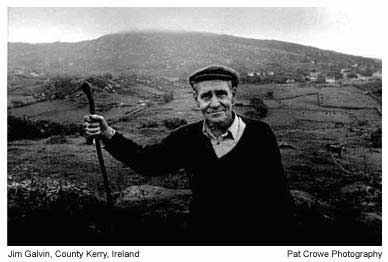 However, ever since "Gangs of New York" came out, I've been fascinated with the enormous shillelagh carried by William "Monk" McGinn. 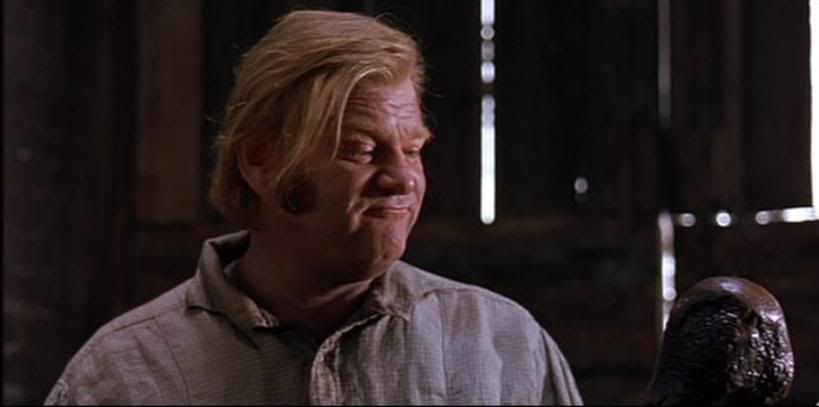 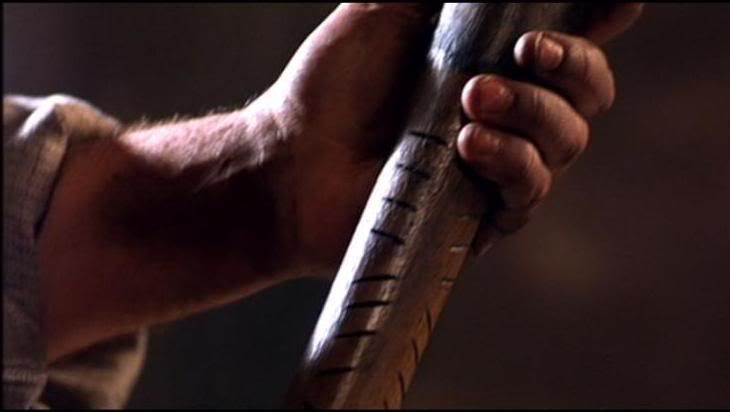 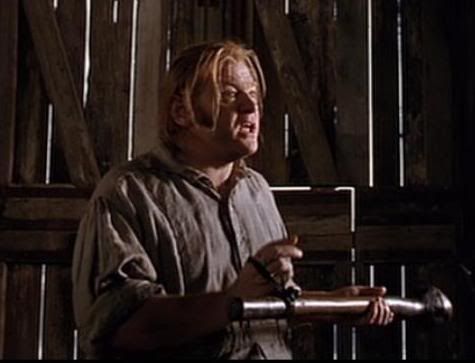 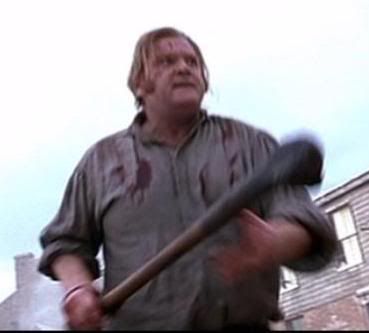 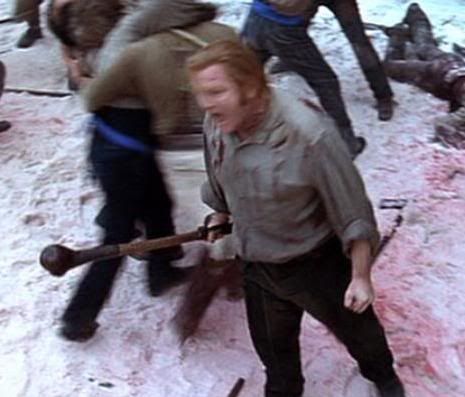 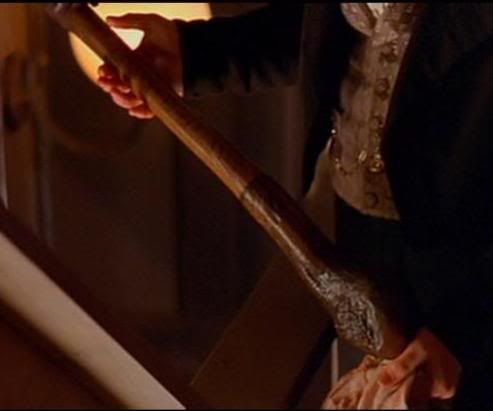 I'm making the assumption that it's actually a shillelagh instead of just a club, since Monk was from Ireland and had already had the thing long enough to tally 40 kill-notches in the handle. I guess I'd call this a "war shillelagh" since it obviously couldn't double as a walking stick. Monk also has a lanyard that he wraps around his wrist. Given the weight of a shillelagh this large and heavy, however, the lanyard is understandable. It also looks like he had the end painted, perhaps with tar or pitch. Dipping the head in hot tar would certainly seal any cracks and enhance its durability. So, has anyone here ever seen or heard of a shillelagh that big? Or is this just strictly the idea of the movie prop makers? |
|
|

|
|
|
#2 |
|
Member
Join Date: Mar 2005
Location: Austin, Texas USA
Posts: 257
|
Your first picture is a blackthorn stick or bata. The movie weapon is a cudgel or Sail-Éille used in Bataireacht.
|
|
|

|
|
|
#3 |
|
Member
Join Date: Jun 2007
Location: Detroit (New Mayapan)
Posts: 96
|
If I google "Sail-Éille", I get sites that say a Sail-Éille is a shillelagh.
 This site says that a bata mór or tríú is a 4-footer, used with two hands. In any event, were cudgels like this used, or is this simply a film prop? If they were, does anyone have examples? |
|
|

|
|
|
#4 | |
|
Keris forum moderator
Join Date: Aug 2006
Location: Nova Scotia
Posts: 7,113
|
Quote:
http://images.google.com/images?ndsp...h&start=0&sa=N |
|
|
|

|
|
|
#5 |
|
Arms Historian
Join Date: Dec 2004
Location: Route 66
Posts: 9,937
|
What a fascinating, and extremely esoteric topic Queequeq!!!
From what I can understand, the original 'sail elle' (phonetically shillelagh, shill ay lee) was literally, a cudgel with a strap. The term 'bata' was applied in Irish to 'stick', thus the term 'bataireacht' described the martial art used by the Irish in the trained use of this simple, but most effective weapon. It appears that the use of these extends into antiquity but by the 18th century had become keenly associated with a form of ganglike warfare with groups known as factions. This led to extremely negative perceptions of the Irish culture and the much maligned connotation of these weapons. The subject of the fascinating, but gruesome movie "The Gangs of New York", colorfully portrays this phenomenon, which was certainly widespead in other nationalities and cultures as well, but here focused on the 19th century in New York. The most common wood seems to have oak used in these, and they were apparantly cured and hardened with smeared butter in chimneys, though with increased trade bringing in more exotic hardwoods from tropical regions, other woods were used also. With the martial intent of these, many were 'loaded' in hollowed section of the business end with lead. Perhaps this might have been the intended image of the very formidable weapon used by 'Monk' in the movie.I'm not sure if pitch or such substance would secure this hollowed and filled feature, but it does seem implied. It does not seem there were specific sizes, and as these were quite personally fashioned weapons, it would most likely have been a matter of preference. The notching shown in the movie weapon for 'kills' is most probably related to this dynamic used in literature and romanticized licence. It has long been popularly held that in the American frontier's 'wild west' that gunfighters would place notches in the handles of thier guns for each victory. In considerable research, it seems that this practice is yet another of the myths perpetrated by storytelling writers, and of the actual weapons of these individuals, none are known to carry notches. It is however noted that Bat Masterson once deliberately did this to a revolver sold to a souvenier hunter. This 'notching' is another interesting topic that has been discussed on our forums previously, and was really pretty interesting. From an anthropological point of view, what strikes me as really interesting is the convergent development of the simple club and its varying forms as a weapon. For one example, the shillelagh seems very similar to the 'knobkerry' of Zulu and associated tribes in South Africa. While in most cultures, the familiar 'club' used from mans earliest times was supplanted by many other weapon forms, but in these, it developed into these forms and prevailed. All best regards, Jim |
|
|

|
|
|
#6 | |
|
Member
Join Date: Mar 2005
Location: Austin, Texas USA
Posts: 257
|
Quote:
 . .
|
|
|
|

|
|
|
#7 | |
|
Arms Historian
Join Date: Dec 2004
Location: Route 66
Posts: 9,937
|
Quote:
Interesting, yes, but indeed profoundly political.....though extremely eloquently worded  As I was writing some of the material on these weapons, I was desperately trying to suppress any politically charged overtones. While I appreciate the comments, I'd also like to keep the focus on the weapons OK. As I was writing some of the material on these weapons, I was desperately trying to suppress any politically charged overtones. While I appreciate the comments, I'd also like to keep the focus on the weapons OK. Thanks Berkley, All the best, Jim |
|
|
|

|
|
|
#8 |
|
Member
Join Date: Mar 2005
Location: Austin, Texas USA
Posts: 257
|
Jim,
Once more, my apologies.  Thanks for a wonderful summary of the Irish martial arts. Thanks for a wonderful summary of the Irish martial arts. Berkley |
|
|

|
|
|
#9 | |
|
Arms Historian
Join Date: Dec 2004
Location: Route 66
Posts: 9,937
|
Quote:
All the best, Jim |
|
|
|

|
|
|
#10 |
|
Member
Join Date: Dec 2004
Location: What is still UK
Posts: 5,806
|
I think clubs have been a weapon of choise for centuries worldwide and great skills develped in there use, either one or two handed long before any colonial surpression. If you are slow with your blade a fast club will take you out just as easy. Not primitive in any way. ouch!!!
|
|
|

|
|
|
#11 |
|
(deceased)
Join Date: Dec 2004
Location: OKLAHOMA, USA
Posts: 3,138
|
I WOULD IMAGINE DUE TO THE SCARICTY OF FOOD AMONG THE POOR IN IRELAND. THEY OFTEN USED CLUBS FOR HUNTING AS WELL AS FIGHTING. THE POOR DIDN'T OWN THE LAND AND WERE OFTEN FORBIDDEN ON PAIN OF DEATH TO HUNT OR POACH ANY GAME. SO I SUSPECT THERE WERE SMALLER HUNTING CLUBS FOR THROWING AT SMALL GAME AS WELL AS THE LARGER CLUBS. THAT HAS USUALLY BEEN THE CASE IN MANY SOCIETYS I AM MORE FAMILIAR WITH THAN IRELAND. THE ADVANTAGES WERE THERE WAS LITTLE COST AS YOU USUALLY MADE YOUR OWN, THE LORDS DIDN'T CARE IF YOU HAD THEM, AND A THROWN CLUB DIDN'T MAKE ANY NOISE WHEN YOU POACHED SMALL GAME. I SUSPECT THE MEN ALSO HAD SOME COMPETICIAN AND GAMES TO SHOW OFF THEIR SKILL AT THROWING. THIS IS ALL A GUESS AS I HAVE NOT STUDIED THE COUNTRY AND PEOPLE OF IRELAND.
I GUESS THE SCOTTS WANTED TO SHOW OFF SO INSTEAD OF THROWING A WEE CLUB THEY THROW THE CABER. 
|
|
|

|
|
|
#12 |
|
Arms Historian
Join Date: Dec 2004
Location: Route 66
Posts: 9,937
|
Thanks Tim for joining in on this, and you're right, it seems that in many a pinch, a baseball bat or pool cue surely took care of business!
BTW, it seems that the stick or cudgel often served in training soldiers in broadsword or sabre movements, seemingly in the manner of kendo in Japanese martial arts (though I realize that in the same way these developed into thier own form of martial arts beyond training exercises). I'm glad to see you on this also Barry! our local club maven! Absolutely well noted on the economic perspective of these times and places, and as for the Scots....when you got bopped with a caper.....you knew it!!  Roosevelt said it best, with a big stick, you can walk wherever and however you want!!  or something like that. or something like that.All the best, Jim |
|
|

|
|
|
#13 |
|
(deceased)
Join Date: Dec 2004
Location: East Coast USA
Posts: 3,191
|
Yes clubs are quite effective and a heavy well made one can break and crush bones even if you get hit in the arms,legs or any part of the torso the are not just head bangers as many people think. Clubs come in all shapes and sizes and are really fun to collect they are one of my favorite weapons.
 Here is one that was used for personal protection by an American geologist during the 1920s-30s in Rhodesia while mining for copper. Here is one that was used for personal protection by an American geologist during the 1920s-30s in Rhodesia while mining for copper.Lew |
|
|

|
|
|
#14 |
|
Arms Historian
Join Date: Dec 2004
Location: Route 66
Posts: 9,937
|
Lew, you always come up with really neat weapons!!! and it seems with intriguing provenance that adds great dimension. Great visuals thinking of what must have been high adventure in those days.
Just though of another discussion not too long ago about the well known police truncheons or 'billy clubs'. Best regards, Jim |
|
|

|
|
|
#15 |
|
Member
Join Date: Oct 2005
Posts: 58
|
Just a side note. The real Monk was actually named Monk Eastman. He was a turn of the century (1900) Jewish gang leader on the Lower East Side.
|
|
|

|
|
|
#16 |
|
Keris forum moderator
Join Date: Aug 2006
Location: Nova Scotia
Posts: 7,113
|
|
|
|

|
|
|
#17 | |
|
Arms Historian
Join Date: Dec 2004
Location: Route 66
Posts: 9,937
|
Quote:
Now THAT'S interesting!! and wonder if he got the idea of notching the club from the dime novel boys writing on gunfighters, or if the idea was his own form of psychological warfare. Along these lines comes to mind Buford Pusser, the southern sheriff in "Walking Tall". Best regards, Jim |
|
|
|

|
|
|
#18 |
|
Member
Join Date: Oct 2005
Posts: 58
|
I don't have my books with me and I might be slightly off on the details, but the story behind Monk's notches was that he was a Sherriff (bouncer) in a wild bar in his younger days. Every time he whacked somebody and threw them out of the bar he put a notch on his club.
When he reached 39 marks he clubbed a random person to make it an even 40. edit to add, Just looked at the wiki link it was for a even fifty. |
|
|

|
|
|
#19 | |
|
Member
Join Date: Oct 2007
Posts: 2,818
|
Nice subject guys and with great historical relevance.
I'd like to offer a few points from my experience thus far. Quote:
This is some text I have gathered from other sources; Irish Blackthorn; "These time-honoured, one-piece Blackthorn Shillelaghs are selected and cut from dense thickets sourced from the forests of Ireland. Blackthorn: Prunus spinosa, is a relative of cherries and plums. Sloe, the blue-black fruits are edible, but bitter until after the first frost. The name for the blackthorn in Ogham, a language used by the Druids, is straif, the origin of the word "strife" and is about Conflict." As seen in my images below, the bark is also present on the root ball head in places. Looking at the initial images supplied of Monk by Queequeg, I too can see bark present on the root ball head. I would say that he is using a very large piece of blackthorn root-ball and trunk and the handle where the notches are, has been stripped of bark and is consistent with the colour presented on mine where time and use has worn away the bark. The full consistent colour of the head of Monk's is due to lacquer that is also present on some parts of mine. As mine is a daily user along side the hounds when I walk them, I know a single blow from one of these could drop a man for good and I have tested it on inanamate objects with devistating effect, so it is no surprise that Monk had 50 notches on his. The one I have pictured is approx 100 years old. Gav Last edited by freebooter; 6th March 2009 at 12:31 AM. |
|
|
|

|
|
|
#20 |
|
Arms Historian
Join Date: Dec 2004
Location: Route 66
Posts: 9,937
|
Thats some intriguing history Gav, I didnt know that about the term for the wood used and its association with the use of the shillelagh.
All this talk about these has just reminded me that my wife is intensely of Irish ancestry.....oh oh!!  All the best, Jim |
|
|

|
|
|
#21 | |
|
(deceased)
Join Date: Dec 2004
Location: East Coast USA
Posts: 3,191
|
Quote:
 
|
|
|
|

|
|
|
#22 | |
|
Member
Join Date: Oct 2007
Posts: 2,818
|
Quote:
  Gav |
|
|
|

|
|
|
#23 | |
|
Keris forum moderator
Join Date: Aug 2006
Location: Nova Scotia
Posts: 7,113
|
Quote:
 Also if the shillelagh was made in the States it seems far more likely that it wood be made of local wood instead of imported Irish Black Thorn. As for the movie prop itself i haven't a clue, though i am not so sure that they would have gone out of their way to create a prop specifically made of Black Thorn since very, very few viewers would give it a second thought. 
|
|
|
|

|
|
|
#24 |
|
Arms Historian
Join Date: Dec 2004
Location: Route 66
Posts: 9,937
|
Right you are Gav!! and frankly I'm glad they dont use 'rolling pins' anymore, remember the old cartoon cliche', I think the strip was "Andy Capp" or something like that, where the frustrated wife always bopped the unwary husband with her 'tool of the trade'. I guess she baked a lot.
Good points David, and the fact that this movie character was based on a figure completely outside the Irish gangs and of later period clearly shows the licence used by film directors to gain aesthetic effect. I have really enjoyed looking into the authenticity of certain weapons often portrayed in some movies over the years. One that I recall was the unusual 'gunstock' club used by Russell Means as the warrior Chingachgook in "The Last of the Mohicans". I recall being intrigued by the stunning blue color of this odd boomerang looking thing with dagger blade protruding. I went berserk as usual with research  and ended up talking with the guy who actually made the weapons for the movie, if I recall he made three, and somewhere in 'the archives' are photos he sent. In speaking with arms authority Norm Flayderman, he noted these were of course, not made from gunstocks, just colloquially called that, and they were used mostly by Plains tribes rather than woodland. and ended up talking with the guy who actually made the weapons for the movie, if I recall he made three, and somewhere in 'the archives' are photos he sent. In speaking with arms authority Norm Flayderman, he noted these were of course, not made from gunstocks, just colloquially called that, and they were used mostly by Plains tribes rather than woodland.Just the same, the weapon chosen seems to have lent well to the movie. If I may, one more example; In "Sleepy Hollow" the 'Headless Horseman' played by Christopher Walken uses a terrifying looking sword that is purely fantasy. I looked deeply into history of the Hessian troops that were in upstate New York during the Revolutionary War, and these troops of the cavalry units from Germany were inadvertantly not mounted. Thier horses had been left behind, though they did carry, in some degree, the huge cavalry swords of the period, brass hilts with odd birdhead pommels and long straight blades. They were so long and cumbersome, and virtually useless fighting dismounted. But the one in the movie, and used on horseback with a wild stallion....frightening!!! As they always say...hooray for Hollywood! All the best, Jim |
|
|

|
|
|
#25 |
|
Member
Join Date: Oct 2005
Posts: 58
|
When Martin Scorsese was converting Herbert Asbury’s non fiction book, The Gangs of New York, to a movie he liked the story of Monk Eastman so much that he simply co-opted much of the character and made him Irish to fit the story.
Also, if you read the book the weapons of choice seem to be brickbats and iron pipes rolled up in newspapers for concealment (Manhattan ethonographic weapon?). I guess it was hard to walk around with a club during any historical period in NYC. Another side note, the character Bill the Butcher in the movie is the real deal. I have tracked him down at the NYC Municipal archives and in the NYPL Social Sciences Library. I even found an insurance map of his butcher shop in the Bowery. |
|
|

|
|
|
#26 |
|
Member
Join Date: Sep 2008
Posts: 97
|
This is very similar .
|
|
|

|
|
|
#27 |
|
Member
Join Date: Jun 2007
Location: Detroit (New Mayapan)
Posts: 96
|
Graeme, that's a nice one!! Do you own it? Any chance of some more pictures, perhaps in hand?
|
|
|

|
|
|
#28 |
|
Member
Join Date: Sep 2008
Posts: 97
|
Yes its mine will take some more snaps .
|
|
|

|
|
|
#29 |
|
Member
Join Date: Jun 2007
Location: Detroit (New Mayapan)
Posts: 96
|
I'm looking forward to these photos. Where did you get it? Any history you can share with us?
|
|
|

|
|
|
#30 |
|
Member
Join Date: Sep 2008
Posts: 97
|
No history im afraid got it from antique dealer who knows i collect clubs .
|
|
|

|
 |
|
|